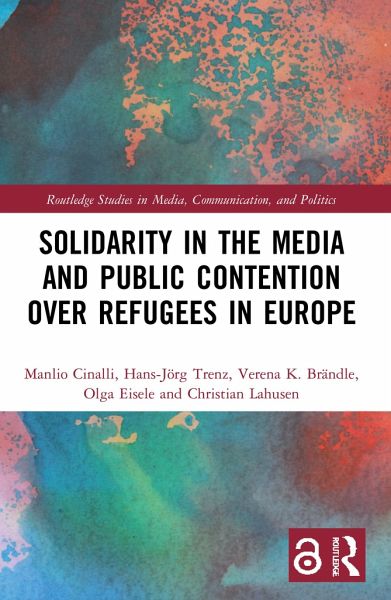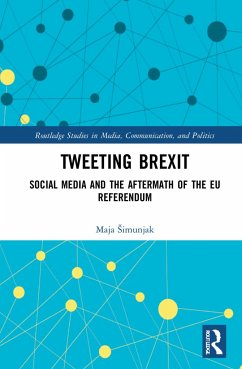
Solidarity in the Media and Public Contention over Refugees in Europe
Versandkostenfrei!
Versandfertig in 6-10 Tagen
42,99 €
inkl. MwSt.
Weitere Ausgaben:

PAYBACK Punkte
21 °P sammeln!
This book examines the 'European refugee crisis', offering an in-depth comparative analysis of how public attitudes towards refugees and humanitarian dispositions are shaped by political news coverage.An international team of authors address the role of the media in contesting solidarity towards refugees from a variety of disciplinary perspectives. Focusing on the public sphere, the book follows the assumption that solidarity is a social value, political concept and legal principle that is discursively constructed in public contentions. The analysis refers systematically and comparatively to e...
This book examines the 'European refugee crisis', offering an in-depth comparative analysis of how public attitudes towards refugees and humanitarian dispositions are shaped by political news coverage.
An international team of authors address the role of the media in contesting solidarity towards refugees from a variety of disciplinary perspectives. Focusing on the public sphere, the book follows the assumption that solidarity is a social value, political concept and legal principle that is discursively constructed in public contentions. The analysis refers systematically and comparatively to eight European countries, namely, Denmark, France, Germany, Greece, Italy, Poland, Switzerland and the United Kingdom. Treatment of data is also original in the way it deals with variations of public spheres by combining a news media claims-making analysis with a social media reception analysis. In particular, the book highlights the prominent role of the mass media in shaping national and transnational solidarity, while exploring the readiness of the mass media to extend thick conceptions of solidarity to non-members. It proposes a research design for the comparative analysis of online news reception and considers the innovative potential of this method in relation to established public opinion research.
The book is of particular interest for scholars who are interested in the fields of European solidarity, migration and refugees, contentious politics, while providing an approach that talks to scholars of journalism and political communication studies, as well as digital journalism and online news reception.
The Open Access version of this book, available at http://www.tandfebooks.com, has been made available under a Creative Commons Attribution-Non Commercial-No Derivatives 4.0 license.
An international team of authors address the role of the media in contesting solidarity towards refugees from a variety of disciplinary perspectives. Focusing on the public sphere, the book follows the assumption that solidarity is a social value, political concept and legal principle that is discursively constructed in public contentions. The analysis refers systematically and comparatively to eight European countries, namely, Denmark, France, Germany, Greece, Italy, Poland, Switzerland and the United Kingdom. Treatment of data is also original in the way it deals with variations of public spheres by combining a news media claims-making analysis with a social media reception analysis. In particular, the book highlights the prominent role of the mass media in shaping national and transnational solidarity, while exploring the readiness of the mass media to extend thick conceptions of solidarity to non-members. It proposes a research design for the comparative analysis of online news reception and considers the innovative potential of this method in relation to established public opinion research.
The book is of particular interest for scholars who are interested in the fields of European solidarity, migration and refugees, contentious politics, while providing an approach that talks to scholars of journalism and political communication studies, as well as digital journalism and online news reception.
The Open Access version of this book, available at http://www.tandfebooks.com, has been made available under a Creative Commons Attribution-Non Commercial-No Derivatives 4.0 license.














